- Home
- Kelley Armstrong
High Jinx Page 3
High Jinx Read online
Page 3
“Really?” he murmurs. “There’s no story?”
His gaze meets mine, green eyes glittering. He knows there’s a story, and he knows I love to tell them. Still, I hesitate.
Was this week a temporary withdrawal? He wasn’t sure that he wanted to continue the friendship, and now he is? He has the right to reconsider, especially given my curse. If that’s what he’s done—and he’s now showing me that he’s past that—then okay. Let’s do this.
I sip my wine. I take a bite of my salad. And then I start the story.
Chapter Three
By the time I finish the story, we’re done with the meal and ready for the brownies. I slip into the back to make coffee. There’s a machine up front—a one-cup brewer with inexpensive knockoff pods. That’s fine for customers, and it’s fine for me, yet I’ve invested in a pour-over system in the back, along with single-origin coffee, for the guy sitting out front. Not that he wouldn’t drink the pods. I’ve seen him drink worse when his caffeine level runs low. But learning a new brewing technique and buying better beans is my way of showing that I “get” him.
Am I overdoing it? Trying too hard?
Gah! I’m overthinking this, and I don’t like it. Don’t like it at all.
As I take him his coffee, he has my brownie set out, with his own cut into tiny cubes, and I have to laugh at that. It’s an in-joke—I’d once cut his up when he was in the balancing phase of a luck-roll. Connolly is a luck worker. He can manipulate luck, but when he does, he suffers a bout of bad in return for the good, when even a bite of brownie could send him into a choking fit.
Ellie sits on a dresser, watching him, narrow-eyed, as she always does. I could take that as a bad sign, but she doesn’t dislike Connolly. She’s just suspicious of this new person in my life. Maybe suspicious of the role he’s filling and how fast he’s filling it.
I pass over the coffee, and I’m about to sit when my phone buzzes.
“Oh, look,” I mutter. “The bid has gone up again.”
I flip over my phone and unlock it. The bid pops up. I read it and swear under my breath.
“Something wrong?” Connolly asks as he eats a tidbit of brownie.
“Someone paid the full asking price. Two grand.”
“That’s inconvenient.” He washes the brownie down with a sip of coffee. “Is there any way of tracking the buyer? You could contact them and try to uncurse it.”
“How? Oh, excuse me, that painting you bought really is cursed. But I can fix it. For free.”
“I wouldn’t say free. Ask for a few hundred and then negotiate. People are overly suspicious of free.”
I shake my head. “While I highly doubt the buyer will let a stranger see their new painting, I can reach out. It’s a username with an account. Damn. It’s a brand-new account, created a few minutes ago. Username . . .” I glance up at him. “PotOfGold7. You bought it.”
“Me?” His brows arch as he pops another brownie bit into his mouth. “That sounds like a leprechaun reference. It certainly wouldn’t be me.”
“Did you just pay two thousand dollars for a cursed painting, Aiden?”
“Certainly not,” he says. “I invested two thousand dollars in a painting that can be uncursed and resold.”
“Not for two grand.”
He lifts one shoulder in a shrug. “One must make a few poor investments to properly appreciate the good ones.”
“Somehow, I don’t think that’s your family motto.”
He takes another bit of brownie. “No, our motto is Oderint dum metuant.” He pops the bit into his mouth. “Let them hate, so long as they fear.”
“Well, I hate to break it to you, but I fear you’ve wasted at least fifteen-hundred bucks.”
“It’s not wasted if it removes a cursed painting from the world.” He lifts his coffee. “Do they offer charitable donation receipts for that?”
I sigh. Then I meet his eyes. “Thank you, Aiden, but—”
“You did not ask me to buy it, or even hint that you wanted me to. Allow me the occasional good deed, Kennedy, even if it doesn’t earn a tax write-off.” He checks his phone. “It says the seller is in New York state. May I suggest we pick it up in person? Perhaps tonight?”
I peer at him.
What’s going on, Connolly? You just did a one-eighty, from canceling our plans and ignoring my calls to buying me a two-thousand-dollar painting and wanting to drive two hours to pick it up.
“Is everything okay, Aiden?”
He meets my gaze again, locking it in. “Everything is fine with us.”
I hesitate. I can’t miss his wording. He’s saying that whatever is going on has nothing to do with me. Which suggests something is going on.
“And you?” I say carefully. “Is everything okay with you?”
His cheek twitches, even as his gaze stays steady. “Everything will be fine.”
I don’t miss the nuances in that answer, either, but it’s all he’s giving me, and I do not have the right to press for more.
“Sure,” I say. “I close at five, and I’m free after that.”
“Excellent. I will make the arrangements and pick you up at six. We’ll have dinner in the city.”
I’m waiting outside the house at six. Hope is with me, while Ani is in the house making dinner. When a car rolls up in front of the house, Hope bends and squints at the driver. The car stops, passenger window rolling down.
“Traded your wheels, huh?” Hope says. “Gotta say, I liked the other one better.”
“As do I,” Connolly says. “However, it’s in the shop.”
“This is the courtesy car? Last time I took ours in, we got a ten-year-old Kia that leaked when it rained.” Hope pats my shoulder. “You kids have fun now.”
“Have you heard from Rian lately?” Connolly asks.
Hope fixes on her blankest look. “Me?”
“If you do, please tell him I need to speak to him. It’s urgent, and he isn’t answering my texts.”
I bite back the urge to snark that I know what that feels like.
“I’ll tell him,” Hope says. “But if you want him to answer, you have to stop marking them all as urgent.”
“I mark them all urgent because they always are.”
“Then maybe, just maybe, you could occasionally text him to say hello, and not only when there’s a family emergency you think he’s caused.”
“I don’t think—” Connolly cuts himself off. “Point taken. However, you might also remind Rian that when I do message to say hello, he accuses me of checking up on him.”
She sighs. “Noted. I’ll talk to him. Also, I’m going to start billing you two for sibling mediation services.”
I slide into the car and wave goodbye to Hope. I wait until we’ve reached the edge of Unstable before saying, “Everything okay with Rian?”
He makes a noise in his throat. In the Connolly family, Aiden is the good son. The golden boy. Rian is the disappointment. The black sheep. All siblings are cast into stereotypical roles. In our family, Ani is “the smart one,” and I often feel overshadowed by that. Hope is “the pretty one,” and I feel overshadowed there, too. I’m “the fun one,” and they feel that shadow cast by that, as weird as it seems to me.
But our roles were assigned by outsiders. To Mom and Dad, we were all smart, all pretty, all fun to be around. With Connolly and Rian, it was their parents who assigned their roles, and their parents who keep them in them, and their parents who use those roles to pit them against each other. Connolly must look after his wild younger brother and rescue Rian from whatever scrapes he gets into, even if they’re half a lifetime past being children, and even if Rian resents the interference, understandably so.
It’s messed up. That’s all I can say. Hope wasn’t joking about sibling mediation. It’s almost like being an interpreter between people who don’t speak a common language. “When you say this, your brother hears that.” “When you do this, your brother feels that.” I’m just glad that they’re both willing to listen.
I’m also willing to listen, yet Connolly only makes that noise in his throat that says yes, there’s an issue, but he doesn’t want to discuss it.
I’ll deduce, then, that whatever’s been wrong in the last few days does indeed have nothing to do with me. Another family emergency that Connolly got sucked into. He had to cancel our weekend, and he didn’t mean to be so abrupt with it. He was just distracted.
I can grumble that if it’s not about me, then I shouldn’t be affected. But while Connolly can be the model of considerate behavior, you don’t grow up in a family like his without developing a strong kernel of self-absorption.
“Hope’s good for Rian,” he says as we reach the highway.
“Um-hmm.”
He glances over. “The question is whether Rian is good for Hope, with the answer being ‘probably not.’”
“I’ve come to accept that if she gets hurt, she’s old enough to deal with it. He’s good for her, too, in his way. My concern is mostly that he’ll be careless with her. He hasn’t been so far.”
“Agreed.” He exhales the word, as if in relief.
“You aren’t your brother’s keeper, Aiden. If Hope does get hurt, I’m not going to blame you. I’m just going to kick Rian’s ass.”
His lips twitch. “I’ll hold him down.”
“Thank you.”
His phone rings. With this not being his car, the caller doesn’t show up on the dashboard. He doesn’t check his watch, just taps the Decline button. He knows who’s calling, and I’d bet my life savings it’s his mother.
“You need to set ringtones,” I say. “So you know who’s calling.”
“I always know who’s calling.”
“There’s also a handy call-block feature. Or one that sends certain callers straight to voicemail.”
He only gives a humorless quirk of his lips.
His phone rings again. Again, he taps Decline.
“Aiden?” I say. “Not getting up in your business, but I’m guessing whatever’s going on explains your sudden urge to fetch a cursed painting tonight.”
A strained chuckle. “I had hoped my motivation wasn’t quite so transparent, but yes.” He hesitates. “Is that all right? I do think it’s safer to get it ourselves. I wasn’t trying to rope you into an unnecessary trip.”
“You didn’t.”
He relaxes into his seat. “Then, yes, if you can temporarily block calls from my mother, I would appreciate that. I would have done it myself, but I told her I was working at home tonight, and she usually respects that.”
I pick up his phone and then hesitate. Is his car really in the shop? His mother has been known to track him, going so far as to send security personnel to “check up” on him if he isn’t where she expects him to be. She treats him like a teenager with a behavioral issue who’s lost the right to privacy. He doesn’t live under her roof. He doesn’t work for her business. He doesn’t give a damn about his inheritance, so she can’t even hold that over him. Yet she holds something, and we haven’t reached the stage where I can ask. I only know that it’s not a matter of telling him to cut the apron strings. These aren’t apron strings—they’re cast-iron ankle monitors.
I won’t ask about the car. Better he thinks I buy the excuse than force him to admit he had to rent a car to play hooky with me.
I open the phone. “Uh, it’s not your mom. It’s someone named Taylor Silver.”
His brows knit. “That’s the seller. Can you check for a message?”
I hold the phone out for him to unlock it with his face. Then I tap voicemail and hesitate.
“Ignore all the ones from my mother.”
“And your father?”
“My father’s calling, too? Now I’m really in trouble.”
He rubs a hand over his face and murmurs an apology, as if that flicker of annoyance had been a raging tantrum. Sometimes I think a raging tantrum might do Connolly a world of good. Whatever lessons his parents have injected, they include keeping his cool at all times, and if that hardened into an icy wall that might be mistaken for arrogance and indifference? Well, it’s better than the “weakness” of an emotional reaction, right?
I’m about to listen to the seller’s voicemail when I notice another message.
“Oh, you also got a voicemail from a Theodora an hour ago. I’ll let you listen to that, presuming it’s business.”
He stiffens, hands clenching the wheel before relaxing. “Yes, I’ll take it later. Thank you.”
Not business then. Theodora O’Toole. The surname screams Irish, and the given name screams money.
“Pretty name,” I hear myself saying before I realize it.
He makes a strangled noise, and my heart thuds down into my feet. I take a deep breath, as quietly as I can.
If he’s seeing someone, that’s none of my business.
Easy to say. Logical and rational. And inside me, something wilts. No, it is pulverized, like a flower crushed under a heel.
It takes me a moment to remember why I’m holding his phone. Then I force myself and hit the Play button on the seller’s message.
“Hello?” A woman’s voice wavers with uncertainty. “Mr. Connolly? I tried to message you on the platform, but I haven’t received a response. I wanted . . .” She pauses, and when she comes back, her voice is firmer. “I needed to notify you that the painting has been sold to another buyer. No charge was made to your account, and I apologize for any inconvenience this may have caused.”
“What?” I say, my voice rising. “She can’t do that. Can I call her back, or do you want to?”
He doesn’t answer, and when I look over, his gaze is distant. I remember the other message. I remember Theodora. He’s still thinking about that. Still trying to figure out how to tell me.
Stop it.
“Aiden? Did you want me to call back?”
“I’m considering our options.”
I relax a little. He switches lanes and then says, “I propose we don’t return the call. That we pretend I didn’t receive the message. I am driving, after all.”
“Show up on her doorstep expecting the painting? Making her face us when she says she sold it out from under you?”
“Precisely.”
Chapter Four
Four
After work, I’d changed my clothing, in case Connolly’s idea of dinner out was a place with a dress code. It’s happened before, to our mutual embarrassment. I mean, if you’re the kind of guy who dresses like him even on Saturdays, you don’t realize when places have dress codes because no one ever stops you. Even if he’s not wearing a tie and jacket, they’ll make an exception, because he’s still better dressed than three-quarters of their patrons. On the other hand, if you’re me, you can’t remember the last time you went to a restaurant with a dress code.
So while I’m not exactly in black-tie garb, I am wearing a dress and low heels, and I’m glad of that as we walk to Ms. Silver’s front door. I look as if I’m with him, and not an employee he brought along to carry the painting.
He rings the bell. When no one answers, he pushes again, harder. The door cracks open, and the sliver of a woman’s face appears.
“Hello?”
“Aiden Connolly,” he says. “I’ve come for my painting.”
“Didn’t you get my message?”
He frowns. “Message?”
“I called.”
He takes out his phone. “Ah, I have it on Do Not Disturb when I drive. Did you need me to meet you someplace else to pick it up?”
“I, uh, I can’t sell you the painting.”
He stares at her for five excruciating seconds before speaking, annoyance sharpening his tone. “I said it was a two-hour drive, and you called when I was already on the road. Is there an issue with me taking possession tonight?”
“I . . .” She takes a deep breath. “I sold the painting to someone else.”
Silence. Connolly lets it stretch a beat too long before he says, “I believe I misheard. You seem to have said you sold it to someone else, which cannot possibly be the case because I bought it.” He looks her square in the eye. “In good faith.”
This is where his privilege truly shines. His bearing. His expression. Even his accent, more Boston than my own, more clipped and cultured. The guy bought a cursed painting off eBay, but he acts as if he purchased a grand master from Sotheby’s, and the seller quails under that look.
“Did I not agree to pay the asking price?”
“Yes, but—”
“Did you not accept that offer?”
“Yes, but—”
“Do I not have . . .” He raises his phone. “Proof that you accepted my offer, on a legitimate sales website.” His chin jerks up, as if a thought has just occurred to him. “Did you perpetuate a scam, Ms. Silver?”
“W-what?”
“A scam. I purchased goods intended to be sent through the mail, across state lines, which makes this a federal offense. You intended to take my money and withhold the goods. Only I arranged to pick them up—at an additional fee, despite saving you the mailing charge—and you didn’t know how to say no without it seeming suspicious. So you agreed, and then messaged me that it was already sold, meaning I cannot prove you never had the goods in the first place. Or so you think. Fraud can certainly be proven. My lawyers will make sure of it.”
She tries to withdraw.
“Yes, it is your right to close the door, Ms. Silver. I will take that as a sign that you wish me to leave your property, which I will do. At that point, the matter is in the hands of our respective attorneys. I will leave my lawyer’s card in your mailbox. It’s a small firm and perhaps not terribly impressive, but that is the price one pays when one’s family employs their own team of lawyers.”
She stops closing the door. “It wasn’t my fault.”
“Does that mean you wish to discuss compensation?”
“C-compensation?”
“Not money, though if the lawyers are involved, obviously money will be required. They may be employed by my family, but that does not mean their work comes free. I believe their current rate is five hundred an hour. However, it is my hope that we can resolve this without involving lawyers or any form of cash compensation.”

 The Calling
The Calling Darkest Powers Bonus Pack
Darkest Powers Bonus Pack Betrayals
Betrayals Sea of Shadows
Sea of Shadows Rough Justice
Rough Justice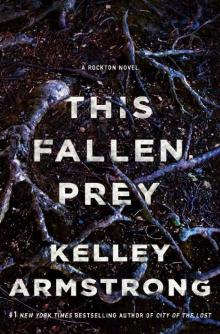 This Fallen Prey
This Fallen Prey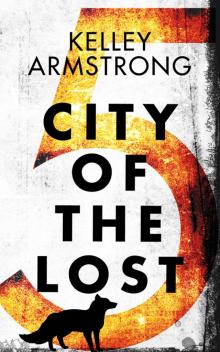 City of the Lost: Part Five
City of the Lost: Part Five Perfect Victim
Perfect Victim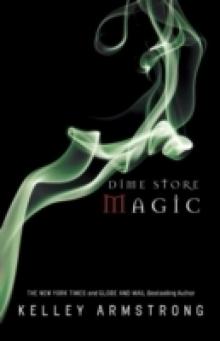 Dime Store Magic
Dime Store Magic Personal Demon
Personal Demon Haunted
Haunted Living With the Dead
Living With the Dead Visions
Visions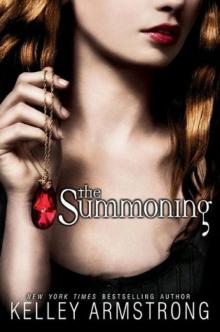 The Summoning
The Summoning Broken
Broken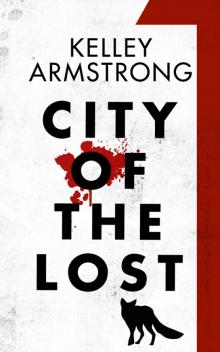 City of the Lost: Part One
City of the Lost: Part One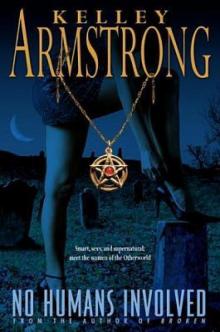 No Humans Involved
No Humans Involved The Awakening
The Awakening The Reckoning
The Reckoning The Gathering
The Gathering Bitten
Bitten Thirteen
Thirteen Gifted
Gifted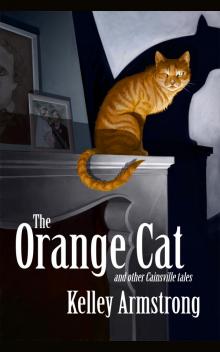 The Orange Cat and Other Cainsville Tales
The Orange Cat and Other Cainsville Tales Darkest Powers Bonus Pack 2
Darkest Powers Bonus Pack 2 Rituals
Rituals Waking the Witch
Waking the Witch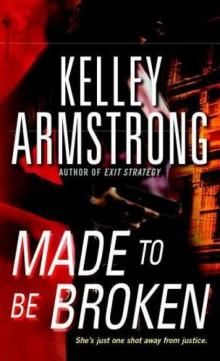 Made to Be Broken
Made to Be Broken Lost Souls
Lost Souls Empire of Night
Empire of Night Wild Justice
Wild Justice Double Play
Double Play Alone in the Wild
Alone in the Wild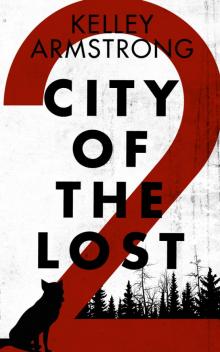 City of the Lost: Part Two
City of the Lost: Part Two A Stranger in Town
A Stranger in Town Watcher in the Woods: A Rockton Novel
Watcher in the Woods: A Rockton Novel Atoning
Atoning Spellbound
Spellbound Wolf's Bane
Wolf's Bane A Darkness Absolute
A Darkness Absolute Ballgowns & Butterflies: A Stitch in Time Holiday Novella
Ballgowns & Butterflies: A Stitch in Time Holiday Novella Wherever She Goes
Wherever She Goes A Royal Guide to Monster Slaying
A Royal Guide to Monster Slaying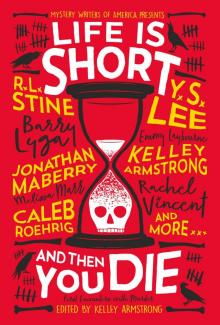 Life Is Short and Then You Die
Life Is Short and Then You Die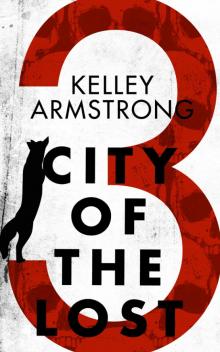 City of the Lost: Part Three
City of the Lost: Part Three Frostbitten
Frostbitten A Stitch in Time
A Stitch in Time Industrial Magic
Industrial Magic Wherever She Goes (ARC)
Wherever She Goes (ARC) Snowstorms & Sleigh Bells: A Stitch in Time holiday novella
Snowstorms & Sleigh Bells: A Stitch in Time holiday novella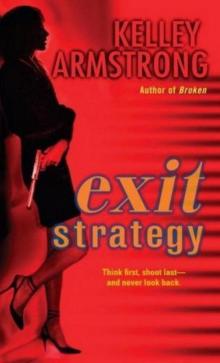 Exit Strategy
Exit Strategy Forest of Ruin
Forest of Ruin Cursed Luck, Book 1
Cursed Luck, Book 1 The Gryphon's Lair
The Gryphon's Lair City of the Lost
City of the Lost City of the Lost: Part Four
City of the Lost: Part Four Deceptions
Deceptions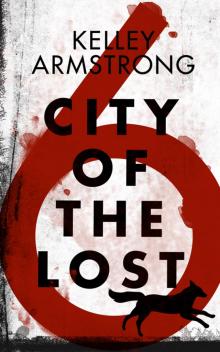 City of the Lost: Part Six
City of the Lost: Part Six Urban Enemies
Urban Enemies Stolen
Stolen Every Step She Takes
Every Step She Takes Portents
Portents Wolf's Curse
Wolf's Curse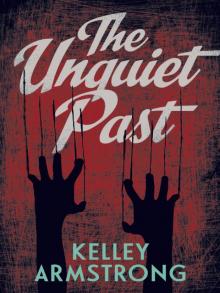 The Unquiet past
The Unquiet past Omens ct-1
Omens ct-1 Cruel Fate
Cruel Fate The Calling dr-2
The Calling dr-2 The Awakening dp-2
The Awakening dp-2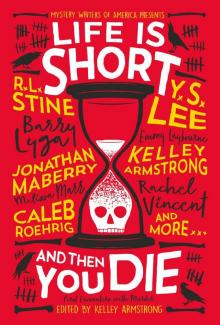 Life Is Short and Then You Die_First Encounters With Murder From Mystery Writers of America
Life Is Short and Then You Die_First Encounters With Murder From Mystery Writers of America Goddess of Summer Love: a Cursed Luck novella
Goddess of Summer Love: a Cursed Luck novella Strangers Among Us
Strangers Among Us The Gathering dr-1
The Gathering dr-1 The Rising dr-3
The Rising dr-3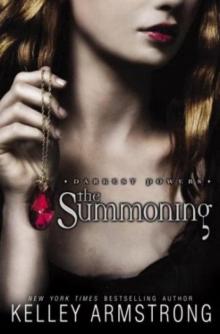 The Summoning dp-1
The Summoning dp-1 The Hunter And The Hunted
The Hunter And The Hunted Waking the Witch woto-11
Waking the Witch woto-11